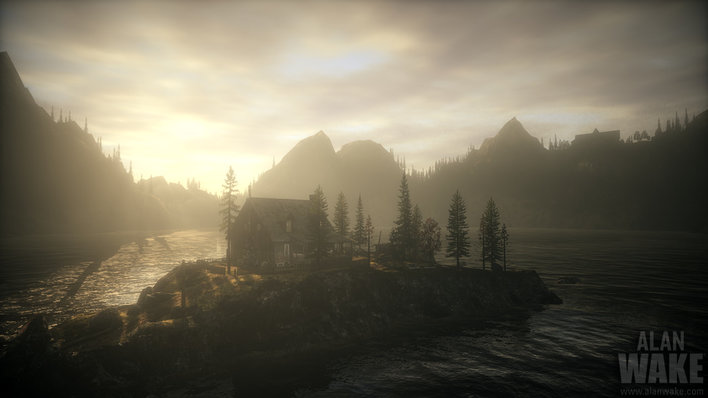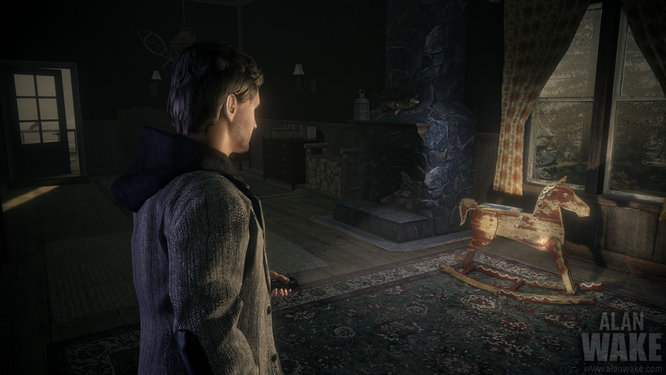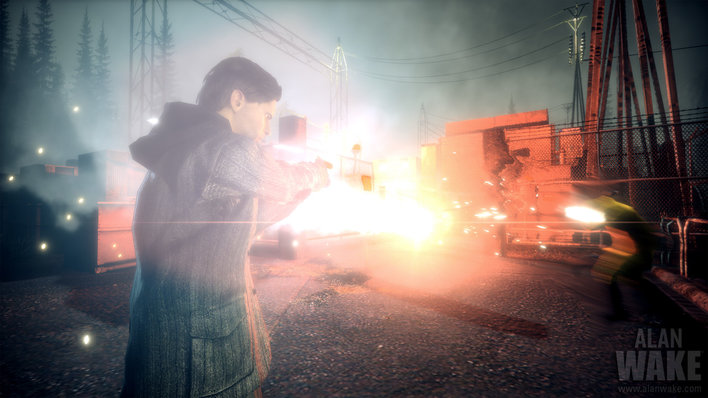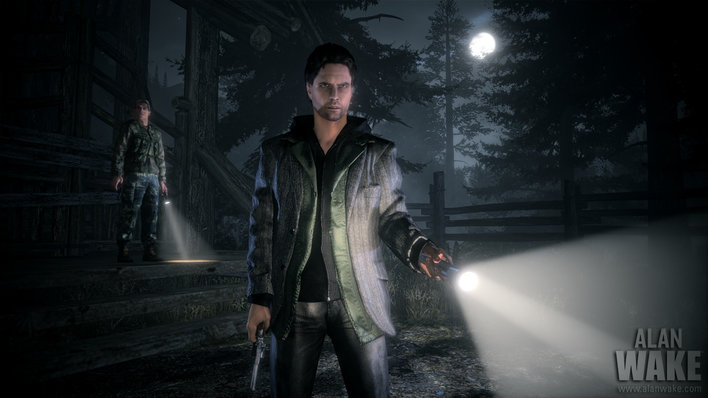Suddenly, you find yourself alone. All around is pitch black. Unwelcoming. In the distance, a street light flickers on and off, as the giant trees that line the rural road begin to sway in a gust that starts up out of nowhere. Instinctively, you head towards the light. But then... a sound. Something behind you. A figure, cloaked in shadow - like a black, swirling oil slick, covering them from head to toe. They shout at you, hurling insults.
"You don't even recognize me, do you, writer? You think you can make people up and kill them when it adds to the drama?"
Suddenly, the figure lunges at you with an axe. In a split second, you dodge, but with no weapon to defend yourself, you do what comes instinctively. You run. In the distance, you spot a log cabin. Sanctuary. A place to regroup - to work out what the heck's going on. As you run, you notice you don't hear footsteps behind you any more. The figure has now turned into a mist, swamping the entire pathway, swallowing up everything into its darkness as you run. As you near the cabin, you're approached by a man. He asks you if you remember him, as you shove him out of the way in a panic, and dive for the safety of the cabin. As you get inside, you peer through the window, and notice the man approach the shadowy figure behind you. Words are echange. Heated. He fires, but the shots do nothing, bouncing off the darkness. You look away, as you hear the slice of an axe, and a scream, as you presume the worst.
Suddenly, the lights flicker out, and darkness engulfs the cabin, too. Frantically, you try the doors, the windows - anything in an effort to break out. To escape. An ethereal voice whispers "die", over and over, as the televisions show an eyeball, frantically scanning around. The rooms shakes, the noise peaks. Suddenly, something violently tears a hole in the end of a cabin, and a voice encourages you to shelter under a street light. Without thinking, you do so, and suddenly, start to feel... safe. As you stop to catch your breath, you start to question what you've seen. Was that real? Or.... could it be all in your head?

The torch is your greatest ally. Use it well.
This is Alan Wake - the new psychological thriller from Finnish developers Remedy, that aims to make you even more afraid of the dark than you were before. You play the role of Alan Wake, an incredibly successful, but insomniac writer (put his first initial and his surname together, and what do you get? Oh ho!), who's suffering from a bad case of writer's block. With his wife by his side, and his literary agent chasing him for his next big hit, Alan decides to head to the idyllic retreat of Bright Falls - a small lakeside town, to try and get his head in order.

Pretty, isn't it.
However, as you may imagine, the idyllic situation doesn't last very long. Soon, Alan's wife, Alice, ends up going missing, and terrible things start to happen. To make matters worse, as Alan searches for his wife, he starts to find pages of a manuscript lying around - torn from a novel that he can't remember writing. Soon, you're plunged head first into a game that's as much a mystery as a thriller, as you try to determine reality from fiction, and unravel the game's gripping plot.

Th... the rocking horse just rocked... On its own... I... I don't... I don't know... Eek! *Jumps through window*
And there's certainly a lot to keep you guessing. Like most of the characters you'll meet and interact with in the game, Alan's a man who has to battle his fair share of demons - both in a physical, and psychological form. As strange things happen around the town, you quickly start to question what's real, and even your own sanity - as do the characters you meet. Everything feels like you're slipping into and out of consciousness - into a dream world, and back into a nightmare - and when you can't remember what you saw, and can't separate fact from fiction - that's when things begin to get scary.
The physical demons we referred to earlier - and the guy who chased you in the opening - are known as the "Taken", and make up the majority of the game's "bad guys". Swirling masses of sheer darkness, these weird, humanoid creatures have only one weakness - light. When the Taken are surrounded by a dark, swirling shield, you can't hurt them - the darkness, inexplicably, simply absorbs the bullets. But when you shine a light on them, and destroy their shield, suddenly, they become vulnerable. Armed with a torch, and a pistol (at least to begin with), you'll find yourself constantly scanning the darkness, looking for any enemies, jumping at any shadow the flickers across in the distance. When you find an enemy, you squeeze the left trigger, to boost the power of your torch, and a small circle begins to decrease as it wears down the shield. With their shield gone, the enemies are surprisingly weak - but it's the time it takes to deplete the shield that makes the combat tricky - especially when you're faced with more than one enemy.

Light. (Hu)mans best friend - the Taken's worst nightmare.
Light is an incredibly important aspect of Alan Wake, and while it certainly plays its role in the combat, it serves several other functions too. Acting as a safe haven from the Taken, streetlights quickly become your best friend, as they provide a place for you to get your breath back, reload, and regroup. And in a rather intuitive twist, light also provides a navigational beacon. In the middle of a wood, in the dead of the night, it's not easy to see where you're going, but the light gives you a way of always finding your destination. Head towards the light, and that's usually where you're meant to be heading - whether it's a petrol station, a lighthouse, or a fire.
Having said this, however, there were quite a few times in the demo where we managed to get ourselves lost, and light didn't work as well as a beacon as we could have hoped. Yes, it showed us our final destination, but actually working out to get there was rather tricky.

It's not just people, either. Objects too, can be possessed by the darkness, which creates a real feeling of unease, as anything could come to life and attack. Probably can't even trust your own shoes.
In a move that's bound to interest novices to the genre, or people who aren't too hot with a dual analogue stick control scheme (left stick moves, right stick looks around), Remedy, the game's developers, have been careful to make the game as forgiving and welcoming for new players as possible. "We don't want you to die, because that's a bad experience." said Remedy's Head of Franchise Development, Oskari Häkkinen, when we asked if the game would be easy for novices to get into, "(That's why) we have a dynamic difficulty system, that adjusts the difficulty based on how well you're playing."
In practice, adaptive difficulty makes some pretty hefty changes to the game. The worse you play - i.e. the more bullets that go whizzing into nearby trees rather than into the Taken, the more damage you take, and the more times you die- the easier the game will get. If the game senses you're struggling, it'll give you less enemies to kill - you'll have more health, and if you're doing really badly, you'll be almost impossible to defeat - instead, you'll get down to next to no health, with the screen red and flashing, and just remain at that level without dying - despite taking plenty of hits - for what feels like an eternity, as you gradually fight your way out of a corner.

It's not all combat - in fact, a large portion of Alan Wake is simply exploration, and interacting with people, as you try to solve your wife's disappearance.
As an example, there was one part of the demo we found incredibly tricky. Finding ourselves on a stage at a rock concert, with music blaring, a large number of "Taken" suddenly start to rush the stage, leaving our back against the wall as we fought against a stage invasion of the undead kind. Holding them off for as long as we could, our buddy ran around the stage, as he struggled to trigger the various props - pyrotechnics, and most importantly, the lighting. As the enemies kept coming at us, we struggled to find ways to keep them away. When they get too much, we simply resorted to our backup plan of dropping a flare, to try and keep them away - not because it really helps you defeat them, but because it buys you some time. But against the sheer onslaught of enemies, and with our torch running out of batteries on a regular basis, this scenario was just too overwhelming us. It took us around four attempts to actually make it through - but to illustrate how the adaptive difficulty works, Sarah - who'd obviously not been doing quite as well for the rest of the game, took around two - because the game made itself so much easier for her.
By understanding that sometimes people want to enjoy a game, rather than be struggling against an unfair difficulty system, and a never ending stream of enemies, Remedy have opened Alan Wake's doors to gamers both experienced, and new, offering a different play experience that will work for everyone - and this is indicative of just how much thought Remedy have put into this game. Everything about Alan Wake oozes quality - from the believable human nature of every character you meet, to the authenticity of the town; the twists and turns of the thriller plot, and even the soundtrack. With over four hours of fully orchestral music backing up the drama, everything about Alan Wake seems to be coming together to create an incredible experience - and as a plus, the game also features music from our Favourite Band of All Time™ the Poets of the Fall.

In summary, Alan Wake is exactly the sort of game Microsoft need to get more people playing on its console. Tense, thrilling, and more involving than anything that's come before it, Alan Wake will suck you into its idyllic world, immerse you in a set of characters that seem more human than any we've come across in a game before, and keep you guessing in a thrill ride you'll never want to wake up from.
If the difficulty level gets fine tuned (and there's every chance it will, as the build we played was a long way from the final thing), you could well be looking at one of the greatest games ever made. And that's not an accolade we give out lightly. Be sure to check back in a fortnight for our full review.
-----
 Second opinion: Sarah Hadley
Second opinion: Sarah Hadley
Not being a massive fan of any game that could be classed as even remotely scary, I was more than a bit apprehensive about playing Alan Wake - even more so, once I was sat in the semi-dark, fake forest room that Microsoft had set up, with the 5.1 headphones on.
However, once I started playing, I realised it wasn't quite the things-jumping-out-at-me type of game I had been expecting. There were a fair amount of puzzles to solve and portions of the book Alan Wake can't even remember writing to find.
One of the features Remedy seem quite pleased about is the adjustable difficulty - in that the worse you're doing, the less enemies it gives you. They say "we don't want people to die, because that's a bad experience" - something I agree with, having given up on many games because I die too much, and end up wondering why I even bother trying...
In my experience, their adjustable difficulty did seem to work - seeing as when I died a couple of times, the enemies did seem to die much more quickly and easily than before - to the point where I actually managed to finish the demo (unlike Resident Evil 5).My only real problems with Alan Wake were that at times it was quite hard to tell where you were supposed to be going, to the point where I was wondering around the same bit of forest for quite a long time (I have the sense of direction of a brick). I also seemed to run out of bullets far too often, and therefore either had to run away or die (I also have the accuracy of a brick). Luckily, though, with their adjustable difficulty, now when I'm taking damage, my character also gets the hardness of a brick, so it's not all bad.














